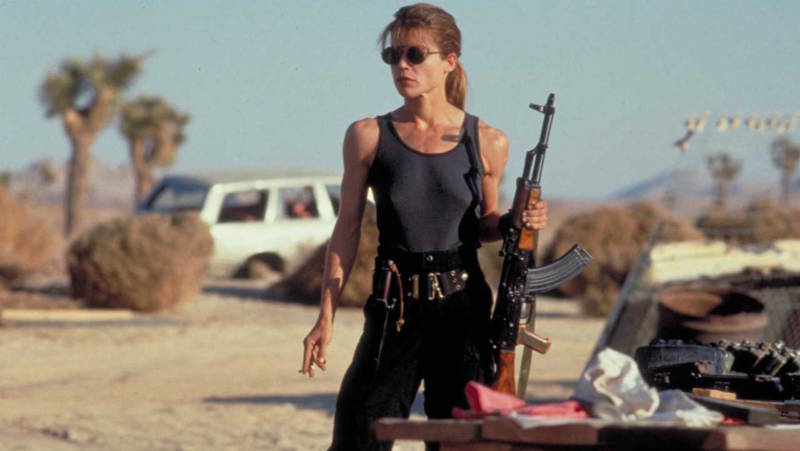In The Terminator, Sarah Connor is targeted specifically because of the child she will bear. But in T2, facing down the imminent apocalypse without Reese on hand to help, she is essentially forced to become him. She is the stern and dedicated soldier now. It's almost as if she's had a Lady Macbeth "unsex me" moment, transforming herself into a human machine in order to fight the actual machines she knows are coming.
Though motherhood is a major aspect of Sarah Connor's life, that fact is directly addressed only once in the movie, when she tells Skynet's Miles Dyson: "Men like you built the hydrogen bomb. You think you're so creative. You don't know what it's like to really create something; to create a life; to feel it growing inside you. All you know how to create is death and destruction." Despite this, Sarah refuses to be defined by motherhood. In fact, just as Lady Macbeth figuratively turned her "mother’s milk into poisonous acid," Sarah Connor has abandoned the role almost completely.
In T2, her son John is 10 years old and already a delinquent on a dirt bike. He is living with neglectful foster parents because an attempt to blow up Skynet's headquarters has landed Sarah in a mental health facility. Inside the hospital, her release back to her son is hindered by her inability to keep her rage in check. After her escape, she remains cold—when John leans in for a hug, she merely pats him down looking for injuries. When this rejection prompts him to cry, she ignores it entirely, even after Arnold Schwarzenegger's machine acknowledges John's tears. She ignores the boy frequently when he talks to her. While John orders his Terminator guardian not to kill anyone, Sarah couldn't care less who dies.
Another key to the movie's characterization of Sarah is James Cameron's absolute refusal to present her through the filter of the male gaze. The director is not averse to scanning Schwarzenegger's body from toe to head in several scenes, but it doesn't happen to Hamilton once. Instead, Sarah remains dressed for combat and make-up-free throughout. Cameron putting a woman at the center of his blockbuster movie without once objectifying her was—and is—a rare choice for Hollywood, and the movie is all the better for it.
In an interview with Prevue magazine at the time, Hamilton characterized T2 as "a violent film about peace." It's also a masculine movie about women, and a tech-focused movie that's ultimately about humanity. It is this backdrop of dichotomies that allows Sarah Connor to expand so far beyond what women are usually permitted to be and do in action movies.
The imminent arrival of Terminator: Dark Fate promises to push things even further. Hamilton returns, starring alongside two other women (try and name another action movie with three female leads, one of whom is a sexagenarian). And James Cameron is back at the helm. (Not only has the director not been involved with the last three Terminator movies, but the prospect of Cameron and Hamilton ever working together again after their disastrous marriage seemed, at best, remote.)
In the end, Sarah Connor is a tribute to the strength and adaptability of women; a symbol of what women can and will do if their survival—and the survival of their children—is threatened. She is a female soldier in a medium that rarely represents them. And her return at a time when women's rights feel very much under assault does not feel accidental.
"I know it's a foolish thing to say," Hamilton told Prevue back in 1991, "But after T2, I don't think anything can hurt me."
She's not alone. Sarah Connor has been giving women a sense of indestructibility ever since.


